GREENEVILLE – Congresswoman Diana Harshbarger heard about the positive impact of multiple federal programs that serve students whose parents have not earned a bachelor’s degree or who come from lower-income backgrounds during a recent visit to Tusculum University.
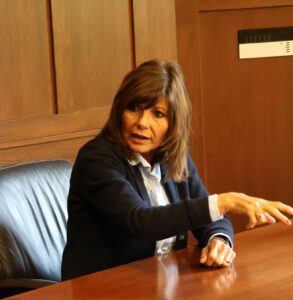
Congresswoman Diana Harshbarger speaks during the meeting.
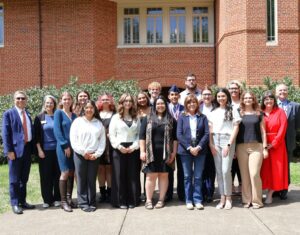
Dr. Scott Hummel and TRIO students and staff pose with Congresswoman Diana Harshbarger outside the Thomas J. Garland Library.
In turn, Harshbarger, a Republican whose U.S. House district includes Tusculum, shared her experiences and dispensed valuable life and career advice and civic lessons to the 15 students who met with her. Seven of the students attend Tusculum and the other eight attend East Tennessee high schools.
The students participate in TRIO federal grant programs, which provide an array of activities designed to encourage those in high school to enroll in college and those in college to earn their bachelor’s and potentially proceed to graduate school. In professional circles, they are classified as first-generation students because of that special status within their families. It is a classification Harshbarger knows well.
“What a pleasure it is to be here with you,” Harshbarger told the students. “I was the first one in my immediate family to graduate from high school or to go on to college, and then I went on and got a doctorate degree in pharmacy. It’s kind of hard when you’re the first one, isn’t it, if you don’t have somebody to encourage you, to push you toward that?”
Tusculum provides seven TRIO programs – two each for Upward Bound, Talent Search and Student Support Services and one for Upward Bound Math and Science. SSS, which includes the ARCHES program, serves Tusculum students, and the others assist pre-college students. Upward Bound was the first program at Tusculum, beginning in 1973.
Viewpoints from Tusculum officials
TRIO programs have served the nation’s students since the 1960s, and Dr. Scott Hummel, Tusculum’s president and also a first-generation student, highlighted their value.
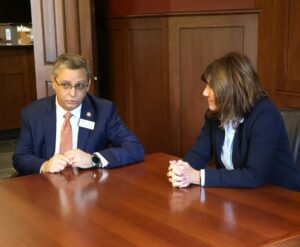
Dr. Scott Hummel, left, Tusculum’s president, makes comments during Congresswoman Diana Harshbarger’s visit.
“Being a first-generation student makes us a little more attune to see potential in other first-generation students,” he said. “There can be a number of obstacles for anybody, but there can be additional ones for first-generation students, and that’s one reason why I am so proud of these TRIO programs. They pave the way for students to be able to get into college and then provide that support for them to be able to graduate from college.
“I think TRIO is an incredible investment by the federal government for students’ economic future, their academic future and our economic future. With that has come opportunity for students and economic development for our region. Tennessee is very fortunate to have these programs and our TRIO staff and the students who participate in them.”
Dr. David Smith, executive director of TRIO programs at Tusculum, emphasized the support the university has received.
“We’re grateful and honored to have Congresswoman Harshbarger join us,” he said. “She’s been a great supporter of our TRIO programs. Each March, we take a delegation of employees from across Tennessee to meet with representatives from the different congressional districts. We’ve always had such a warm welcome.”
The congresswoman’s personal story
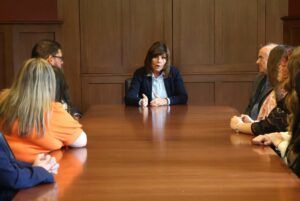
Congresswoman Diana Harshbarger, center, speaks with TRIO students and staff.
Harshbarger shared some of her personal story. She was told when she was young that she needed to take two years of shorthand and typing and then pursue a local secretarial job. She concluded she did not want to take that path, and she worked at a grocery store as a cashier while going to college. She married at 22 and agreed to work to support her husband who was still in college.
Later, while he was in pharmacy school, she would support him by typing his notes, and he asked her whether she had similar career aspirations. She proceeded to enter pharmacy school and became a pharmacist. She has been in that profession for 39 years and was elected congresswoman in 2020.
“You never know where life is going to take you,” Harshbarger said. “Don’t let anybody ever tell you that you can’t do something. Yes, you can. Don’t ever limit yourself on what you can do. You can do anything you want to do. They are setting you up for success at Tusculum. God orders our steps. If you are grounded in your faith, you can do anything in this world.”
Student questions
One student, Nora Scott, a senior at South Greene High School, asked Harshbarger for insight on ways she could reach the same heights as the congresswoman. Harshbarger told her to start by becoming involved at the local level and speaking with elected officials there. She said it is important for students to be grounded in the political system.
Harshbarger quizzed the students about the names of the U.S. senators from Tennessee, the number of U.S. House members, the majority leader of the U.S. Senate, the vice president and Tennessee’s governor.
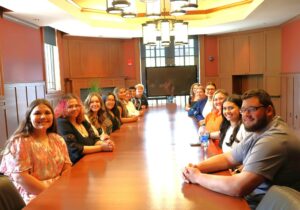
TRIO students pose for a photo before Congresswoman Diana Harshbarger’s arrival.
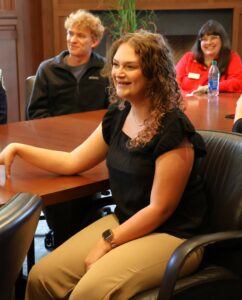
From left to right, Tusculum students Jerry Ricker and Savannah Webb and Meagan Stark, associate director of Student Support Services, enjoy a fun moment during Congresswoman Diana Harshbarger’s visit.
Tusculum junior Savannah Webb, a communication major, asked Harshbarger whether she experienced problems as a woman with a southern accent. Webb, who is a member of Tusculum’s debate team, said she has noticed that people with such attributes tend to be taken less seriously.
“With the southern accent, I’m just viewed as the expert from out of town,” Harshbarger said. “As a southern woman, I don’t change the way I talk. The thing is, I have made myself a credible member. The key to me is to prepare. To differentiate myself, I had to show them that they shouldn’t take me for granted.”
Another Tusculum student who asked a question is junior Jerry Ricker, who is studying sport science and hopes to become a teacher. He asked whether Harshbarger has felt as a first-generation student that she had to confirm with herself that she earned the opportunities college provided her.
“There is no such thing as luck,” Harshbarger said. “There’s opportunity. That’s what you’ve got. When I became successful, I kind of beat myself up, asking, ‘Why has God blessed me with what he’s blessed me with?’ That was hard for me until I heard Charles Stanley talking about that one day. It’s a gift. But with that gift and your success comes a lot of responsibility. You have been one of those people who have worked hard and have been chosen for a program. You’re going to excel at what you do. Don’t beat yourself up. You put yourself in those places of opportunity.”
SSS students who participated in the discussion were Emily Head, Jeff Linton, Jerry Ricker, AnnaLee Simpson, Savannah Webb and Janelle Zirger. Talent Search representatives were Gracie Monk from Chuckey-Doak High School and Nora Scott from South Greene High School.
Upward Bound participants were Bri Duchaney from Cherokee High School, Guadalupe Flores from Chuckey-Doak, Jan Hernandez Ramos from Morristown East High School and Ana Rodriguez from Volunteer High School. Upward Bound Math and Science members who attended were Sam McCamey from North Greene High School and Charlie Taylor from Chuck-Doak.
To learn more about Tusculum’s TRIO programs, please visit https://site.tusculum.edu/student-success/academic-affairs/first-gen/. Additional information about the university is available at www.tusculum.edu.


